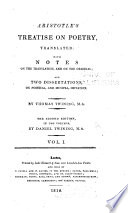 | Aristotle, Thomas Twining - Aesthetics - 1812 - 386 pages
...language; and to write verses, was, to make. Sir Philip Sidney, speaking of the Greek word, says—." wherein, I know not whether by luck " or wisdom, we Englishmen have met with the Greeks, " in calling him Maker" Defense of feesy. So Spenser; The god of shepherds, Tityrus,... | |
 | Aristotle, Thomas Twining - Aesthetics - 1812 - 380 pages
...language ; and to write verses, was, to make. Sir Philip Sidney, speaking of the Greek word, says — •" wherein, I know not whether by luck " or wisdom, we Englishmen have, met with the Greeks, i1 in calling him Maker" Defense of Poesy. So Spenser ; The god of shepherds,... | |
 | 1830 - 530 pages
...most excellent, gone through other languages; it cometh of thi« word coiíñi, which is to moke ; wherein, I know not whether by luck or wisdom, we Englishmen have met with the Greeks in calling him '• maker,' which name, how high and incomparable a title it is,... | |
 | English literature - 1831 - 368 pages
...hath, as the most excellent, gone through other languages ; it cometh of this word noieiv, which is " to make " ; wherein, I know not whether by luck or wisdom, we Englishmen have met with the Greeks in calling him " a maker," which name, how high and incomparable a title it is,... | |
 | William Dunbar - 1834 - 422 pages
...which name, as the most excellent, hath gone through other languages. It cometh of this word .r«iiV, to make: Wherein I know not, whether by luck or wisdom,...Apologie of Poetrie," prefixed to his translation of Arms to, 1591, should have referred to Puttenham's Art of English Poesie, as the first to have introduced... | |
 | William Dunbar - 1834 - 412 pages
...which name, as the most excellent, hath gone through other languages. It cometh of this word VOIM, to make: Wherein I know not, whether by luck or wisdom,...Englishmen have mette well the Greeks, in calling him a maker.99 It is strange, therefore, that Sir John Harrington, in his " Apologie of Poetrie," prefixed... | |
 | John Wood Warter - 1853 - 408 pages
...hath, as the most excellent, gone through other languages; it Cometh of this word irotuv, which is to make; wherein I know not, whether by luck or wisdom, we Englishmen have met with the Greeks in calling him ' a maker.'" Puttenham begins his first Book of " Poets and Poesie... | |
 | John Wood Warter - Sussex (England) - 1853 - 390 pages
...hath, as the most excellent, gone through other languages ; it cometh of this word iroiiiv, which is to make ; wherein I know not, whether by luck or wisdom, we Englishmen have met with the Greeks in calling him ' a maker.' " Puttenham begins his first Book of " Poets and Poesie... | |
 | Aristotle - 1857 - 532 pages
...language ; and to write verses, was, to make. Sir Philip Sidney, speaking of the Greek word, says, " wherein, I know not whether by luck or wisdom, we Englishmen have met with the Greeks, in calling him maker." Defense of Poesy. So Spenser : The god of shepherds, Tityrvs,... | |
 | Richard Chenevix Trench (abp. of Dublin.) - English language - 1859 - 256 pages
...which name, as the most excellent, hath gone through other languages. It cometh of this word Troieiy, to make ; wherein I know not whether by luck or wisdom we Englishmen have met well with the Greeks in calling him a maker. Sir P. Sidney, The Defence of Poetry. oeuvre/ to work... | |
| |